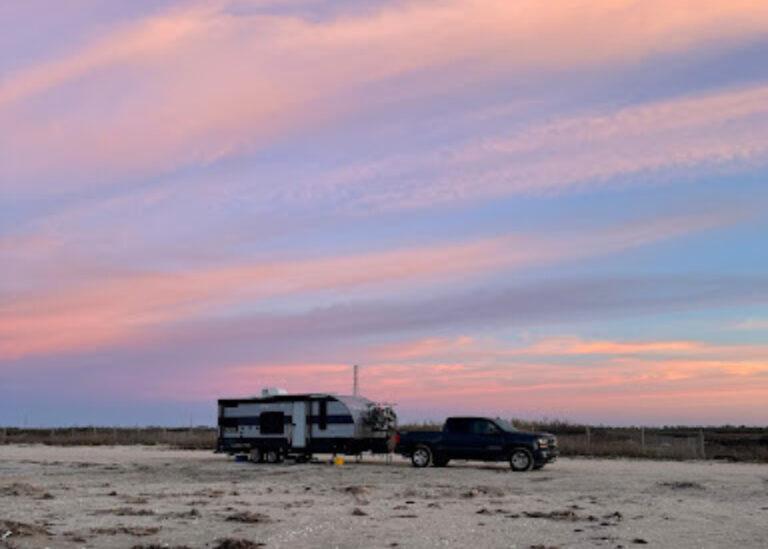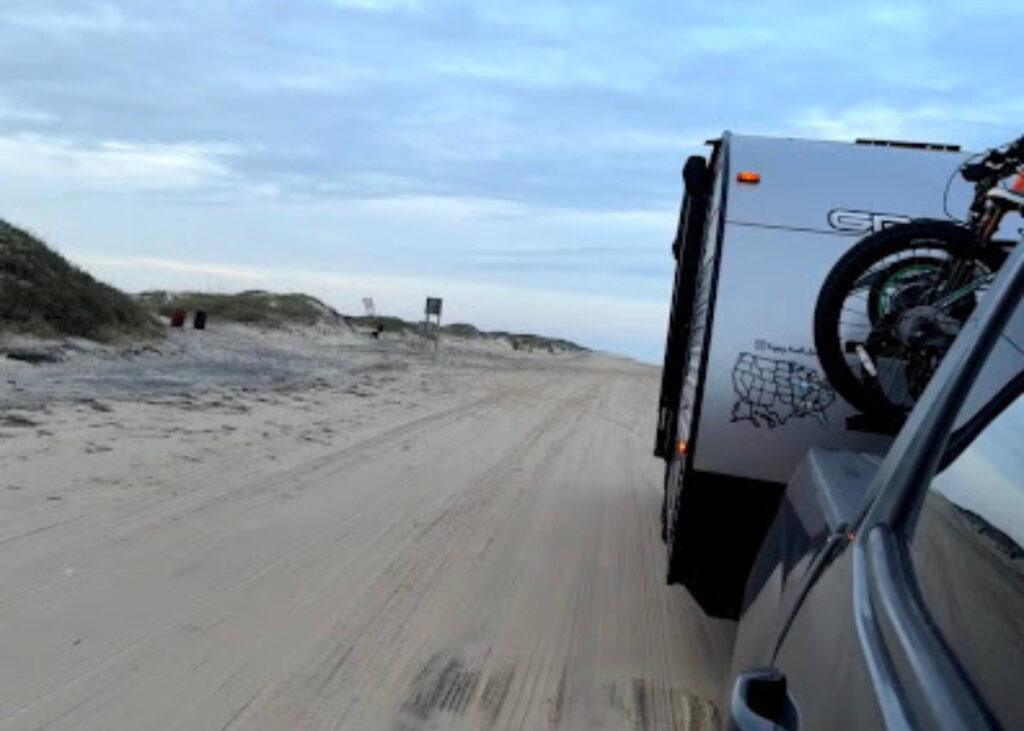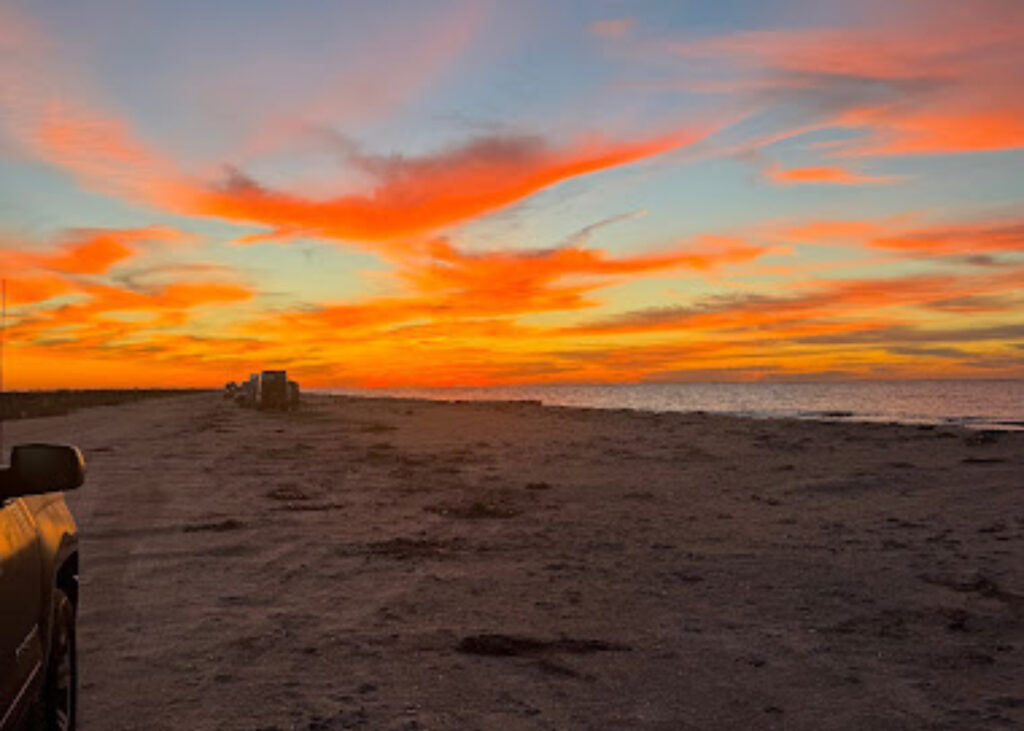
Camping on the beach is easily one of our favorite places to boondock. The constant sound of waves, the starry nights, and the incredible amount of playing in the sand all make for a beautiful experience. We love collecting shells, practicing our knife throwing, going for swims if we can, and just running wild. Whether it’s waking up to breathtaking sunrise views over the ocean or falling asleep under a blanket of stars, the beach offers endless opportunities for relaxation and exploration. However, it’s essential to plan ahead, considering factors like tides, weather conditions, and local regulations. With that being said, parking your RV on the beach can be an amazing experience but it comes with stressors and can even be a nightmare without proper planning and precautions.
Research Your Beach
Before embarking on a beach camping trip, thorough research is paramount. Ensure it is legal to boondock on the beach you are interested in, check the permitted length of stay, determine if any permits are needed, and make sure to adhere to rules and regulations. Most of the beaches we have stayed on so far allow boondocking for up to 14 days. You can read reviews from websites or boondocking apps about a beach to find out if your camper’s size is suitable. It’s also important to learn if other boondockers have encountered issues turning their campers around on the shoreline or with getting stuck in the sand. A great app we use to find boondocking spots for our travels is Campendium!
Weather and Tides
Weather conditions can affect the accessibility of the beach and surrounding areas. High tides, for example, may flood certain parts of the beach, making it difficult or even impossible to access or maneuver your vehicle. It’s important to check if there is any potential of severe weather conditions such as storms, high winds, or heavy rain which can pose significant risks to campers parked close to the water. Being mindful of upcoming weather conditions allows campers to take necessary precautions or evacuate if required for safety. Additionally, knowing the forecast can help you pack suitable clothing and gear for comfort in varying conditions, whether it’s sun protection for clear days or rain gear and warm layers for inclement weather.
About high tide
It’s important to keep in mind that even if high tides appear manageable initially, strong ocean winds can intensify the tides. Coupled with heavy rainfall, this combination can result in your rig sinking in the sand or, in extreme cases, being swept out into the ocean. Our own experience taught us the importance of using leveling blocks or wooden pieces under the trailer jack, stabilizers, and tires to enhance stability. This lesson was learned when our trailer jack sank into the sand after rainfall, prompting us to use a bottle jack to lift ourselves out! Checking tide schedules is easy with a quick web search for the beach you’re visiting. Arriving close to high tide ensures awareness of water levels throughout your stay. If you arrive during low tide and are uncertain about high tide conditions, stay prepared to leave if the water approaches uncomfortably during rising tides. Familiarize yourself with beach entrances and exits, and always keep the tide chart accessible for the duration of your visit.
Plan Ahead for Necessities and Emergencies
When planning ahead for boondocking on a beach, thorough preparation is key to ensure a smooth and enjoyable experience. Start by researching the specific beach you’ll be visiting to identify nearby amenities such as grocery stores, gas stations, and water sources. Pack an ample supply of food, water, and fuel based on the duration of your stay and the remoteness of the location. Additionally, plan ahead for disposing of your trash if there is no dumpster onsite. Familiarize yourself with the location of the closest designated dump station to ensure proper disposal of your RVs black tank. In case of emergencies, be prepared by packing a first aid kit, emergency supplies, and communication devices, especially if a hospital is not nearby. Utilize boondocking apps to review cell service and internet connectivity in the area based on your providers, ensuring you can contact help promptly in case of an emergency.

Safety & Preparedness
Safety is of utmost importance when beach camping. Before swimming, assess water cleanliness and watch out for currents, riptides, unstable cliffs, and wildlife, including sea life like jellyfish. More often than not there will be signs at the beach entrance often highlighting these concerns. We’ve encountered beaches where water access was restricted due to bacteria concerns and others filled with jellyfish. Be sure to check posted signs and stay informed by reviewing tide schedules and weather forecasts to plan accordingly.
Getting Stuck
It hasn’t happened to us, but it does happen a lot on the beach with RVers. When boondocking on the beach, the possibility of getting stuck in the sand is a real concern. The soft sand at the beach makes it easy for tires to become trapped, especially for vehicles with low traction or weight distribution. Factors like tire pressure, vehicle weight, and driving technique all contribute to the likelihood of getting stuck. Additionally, the absence of paved roads or established trails on beaches increases the risk of inadvertently entering softer, deeper sand. While getting stuck is a possibility, being prepared with traction aids such as sand tracks, shovels, and tow straps, along with knowledge of proper recovery techniques, can help minimize the risk. It’s also essential to know who to contact for assistance in the unfortunate event that you need to get towed out of the sand.
Keep an Eye for Rust
As a family, we absolutely love camping on the beach but it’s not without its drawbacks. We’ve noticed the impact of the salty sea air on our belongings, particularly on our bike chains, stabilizers, and even our tow hitch after just a few days parked by the shore! Rust can be a significant concern when boondocking on a beach due to the corrosive effects of saltwater and salt-laden air. Saltwater is highly corrosive to metal surfaces, accelerating the oxidation process and leading to rust formation. Constant exposure to salty air and water can cause metal components such as vehicle frames, trailer hitches, and camping equipment to deteriorate rapidly. Additionally, salt residue left on surfaces can attract moisture from the air, further exacerbating the corrosion process. Even stainless steel, which is more resistant to rust than regular steel, can still corrode when exposed to prolonged saltwater conditions. To mitigate the risk of rust, it’s essential to rinse off vehicles and equipment with fresh water after beach outings and to regularly inspect and maintain metal surfaces for signs of corrosion. Applying protective coatings or rust inhibitors can also help prolong the lifespan of metal components in beach boondocking environments.
Power Considerations
Is your rig equipped for boondocking? This is something to consider not only at the beach but also in locations without traditional electrical hookups. We’ve invested in alternative power options such as solar panels and a solar generator, harnessing sunlight to charge our devices and power our rig. This environmentally friendly solution suits us well, particularly since beaches often offer ample sunlight without tree coverage. However, in instances where solar isn’t viable or during overcast days, we rely on a gas generator to ensure power for our RV. Despite their reliability for larger appliances, we’re mindful of the noise and emissions generators produce, which can disrupt the tranquil beach environment. For smaller devices, we rely on portable battery packs, offering convenience and flexibility during our beach trips. Ultimately, understanding your rig’s capabilities is key before embarking on beach camping adventures, allowing you to make informed decisions about power sources based on your individual needs, environmental considerations, and personal preferences.
Dunes, Fishing, and Fires
Much of the land near the coast is a habitat for various protected wildlife, including endangered birds and sea turtles. To preserve these ecosystems, it’s crucial to respect the dunes, dispose of trash responsibly, and fish in a sustainable manner. We often take walks along the beach and pick up any litter we see washing up, contributing to the preservation of the coastal environment.
While parked along the beach, we frequently observe fellow RVers fishing along the shoreline, often reeling in impressive catches. When planning a fishing excursion while beach boondocking, it’s essential to adhere to a few guidelines. First, check local fishing regulations and obtain any required permits. Be mindful of the season and time of day for optimal fishing conditions. Pack necessary gear and always check weather forecasts and tide charts for safety. Additionally, practice responsible fishing habits, including proper disposal of fishing lines and showing respect for marine areas to ensure a sustainable fishing experience for all.
Beach campfires are another amazing activity while boondocking on the beach, offering a cozy way to unwind as the sun sets over the horizon. However, it’s vital to check local regulations regarding fire pits and obtain any necessary permits. Some beaches allow it while others do not. By enjoying campfires responsibly, we can continue to savor this beloved beach tradition while protecting the coastal environment for future generations to enjoy.

Enjoy the Company!
Camping on the beach often attracts crowds, especially during peak seasons, but RVers can still find pockets of seclusion along the coastline. Embracing the possibility of encountering fellow campers or fishermen can enrich the experience. Interacting with like-minded families adds a sense of community to beach stays, creating opportunities for shared adventures and camaraderie. While we’ve never felt crowded, we’ve also never been completely alone during our winter beach camping excursions. Instead, we’ve discovered a balance between enjoying the serene beauty of the coastline and connecting with others who share our love for the beach.
Don’t be intimidated, but rather be ready! Boondocking on the beach offers some of the most rewarding experiences. With careful research, a focus on safety, and a deep respect for nature, beachside adventures can turn into cherished memories that last a lifetime. While the ocean’s power is undeniable, the thrill of boondocking on the beach is unmatched. So, dive into your research and make your beachside adventure a reality!
Learn more from the Happy Trails Family:
Boondocking with a family of four.
How your kids can become junior rangers in national parks.
Curious about what RV life is all about? Rent an RV from RVshare and find out!
